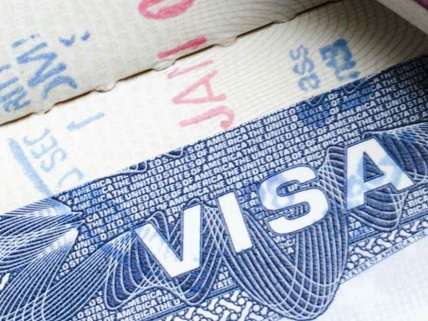Trump Admin Revoked 100,000+ Visas, Govt Attorney Tells Judge—State Dept Says It's Under 60,000
During the 90-day ban, the government is considering whether to extend it in duration and scope.

An attorney with the Department of Justice's Office of Immigration Litigation, Erez Reuveni, told a federal judge in Virginia today that the government had revoked more than 100,000 visas, yielding gasps from courtroom observers, the Washington Post reports. Reuveni said he didn't know how many visa-holders the government sent back to the seven "countries of concern" from which President Trump's executive order of last Friday temporarily banned virtually all travel, but claimed all green card holders detained at airports around the country over the weekend had been allowed into the U.S.
Meanwhile, the State Department disputed those numbers. It said fewer than 60,000 visas were revoked per the executive order, the Associate Press reports. In 2016, the department issued 31,754 immigrant visas for nationals of the seven affected countries—Libya, Iraq, Iran, Somalia, Sudan, Syria, and Yemen. In 2015, it issued 72,162 nonimmigrant visas—numbers from 2016 are not available. A State Department spokesperson told the AP the attorney's confusion came from including diplomatic visas (diplomatic travel has not been banned, so it's unclear why the DOJ would include them, except for the entire process being dominated by chaos and a lack of clarity) and visas that had already expired prior to the order taking effect.
Nevertheless, both numbers are far higher than the 109 number cited by Press Secretary Sean Spicer, referring to those people immediately affected by the order because they were in transit when it was issued. "Three hundred and twenty-five thousand people flew into this country from airports and 109 people were affected and slowed down in their travel," Spicer said. "I understand that is an inconvenience but at the end of the day that is a small price to pay as opposed to somebody losing their life because a terrorist attack was admitted."
Two Yemeni brothers who said the government seized their visas, revoked their permanent resident status and sent them on a return flight to Ethiopia filed this particular suit where the DOJ attorney told the court more than 100,000 visas were revoked. The judge in the case, Leonie M. Brinkema, said she'd never seen "so much public outpouring" as I've been in this case" before, according to the Post. "This order touched something in the United States that I've never seen before. It's amazing."
The government, the Post reports, is attempting a "case by case reprieve" and has offered the brothers new visas in exchange for dropping their lawsuit. Customs and Border Patrol says it has granted 87 visa holder waivers and "recommended denial of boarding" to 1,136.
The State Department, meanwhile, is encouraging nationals of the seven banned countries who have begun the process of applying for an immigrant visa to continue to do so. It recommends applicants "continue to pay fees, complete your Form DS-260 immigrant visa application, and submit your financial and civil supporting documents," although all interview appointments in February for applicants from the banned countries have been canceled. Nonimmigrant visa applicants, on the other hand, are recommended not to pay any visas at this time.
The whole fiasco surrounding the executive order, and especially the casual cruelty and heavy-handedness toward lawful permanent residents and legal visa-holders, reveals that, indeed, for some critics of immigration, the distinction between legal and illegal immigrant is not particularly important. The government's approach to people holding legal documents permitting them to travel to or even live in the United States undermines the legal immigration system and discourages legal immigration more than any kind of relief for long-term illegal immigrants who otherwise abide the law could have. Moreover, it further engrains the idea that the government need not limit its actions to what is necessary or proper, nor even to pay lip service to the constitutional principle, as previous Republican presidents have often at least tried to do. Whatever else may be disrupted in the new administration, the decades long project of the government undermining basic principles of the rule of law will continue unabated, with a new set of cheerleaders.


Show Comments (52)